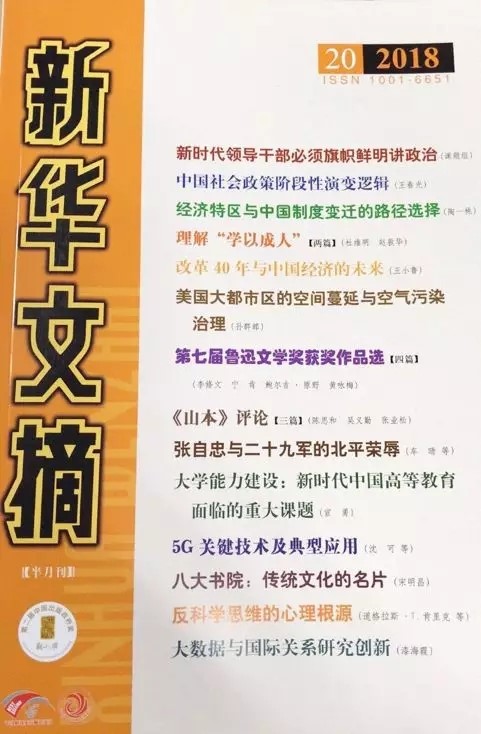Prof. Tao Yitao's voluminous academic paper titled Special Economic Zones and the Path Choice of China’s Institutional Change published in "Monographs of Distinguished Scholars" of Journal of Macao Polytechnic Institute, Issue 3, 2018 made it to the cover of and was reproduced by Xinhua Digest, Issue 20, 2018.

Prof. Tao Yitao starts with the theories of institutional change in the paper and elaborates on the internal logical mechanism and practical logic between the special economic zones (SEZs) and the path choice of institutional change in Chinese society. She believes that the thoughts and studies about the SEZs and the path choice of China's institutional change are actually the thoughts over the 40 years of China’s reform and opening-up, the studies about China's path to modernization, and the exploration into the internal logic relationship between the SEZs and the China’s path. This is because the forty years of China's reform and opening-up is an arduous and glorious journey for China to shift from traditional planned economy to socialist market economy, from widespread poverty to common prosperity, from blindly closing our door to all-around opening-up of policies and institutions, and in particular, it is more a great and wonderful journey of building a moderately prosperous society in all aspects and realizing the Chinese dream. All these stem from the establishment of the SEZs and at the same time represent the evolution path of the institutional change in Chinese society.
SEZs are the breakthroughs in China's reform and opening-up, and set off the journey to explore the path of institutional change in Chinese society. As a mandatory institutional arrangement, the SEZs have broken the general balanced condition under the traditional system to enable unbalanced development as the optimal path choice for institutional change. The glorious accomplishments achieved by SEZs represented by Shenzhen enable "backwash effect", "spread effect", and “tickle-down effect” in the theories of traditional regional economics to emerge "non-typically" in a Chinese-style mechanism, and interpret the uniqueness of the path of institutional change in Chinese society. The establishment and formation of typical SEZs, broad SEZs, free trade zones and bay areas representing an extension of SEZs are a result of combining "gradient development" with "anti-gradient development", and the gains of institutional change. The trajectory of institutional change reflects the internal logic between SEZs and institutional change and constitutes the theoretical mechanism thereof.
